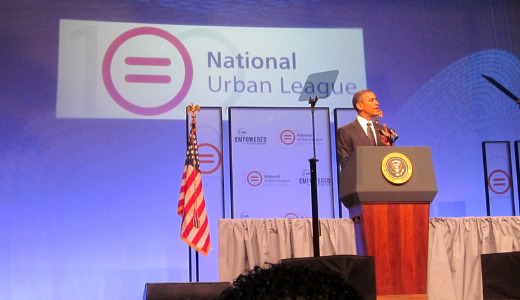
WASHINGTON – President Obama defended his “Race to the Top” education reform program in a July 29 speech to the National Urban League just days after they and five other civil rights organizations criticized his plan in a hard-hitting report .
Race to the Top offers $4.35 billion in competitive grants to states that commit to the Obama education reform program. The president said charges that Race to the Top is not “targeted at those young people most in need” are “absolutely false” and he vowed to veto cuts in the program.
His reaction suggested that he had not read the civil rights groups’ 17-page report. It is a balanced critique. It praises measures in the president’s program that promote public education, but also provides a list of recommendations including a call for “universal, high quality, early childhood education” and “universal access to highly effective teachers” paid higher wages and wth better working conditions.
Indeed, Obama was greeted at the Urban League’s Washington convention for spearheading the fight for a $10 billion bill to prevent the layoff of 300,000 teachers. The funding has been blocked so far by Republican senators.
Yet the report also takes aim at the Obama administration’s stress on competition, its favoritism for charter schools and its “turnaround model” that includes punitive measures like mass firing of faculty and closing of low-performing public schools. A recent Stanford University study of charter schools exposed them as performing more poorly than their public school counterparts.
“If education is a civil right, children in ‘winning’ states should not be the only ones who have the opportunity to learn in a high-quality environment,” states the report. “The Race to the Top Fund and similar strategies for awarding federal education funding will ultimately leave states competing with states, parents competing with parents, and students competing with other students.”
The report points out that only 15 states and the District of Columbia have made it onto the “shortlist” of states eligible for possible Race to the Top funding.
These states contain only 37 percent of the students in the United States eligible for free and reduced lunches. Overall, 74 percent of Hispanic students live outside finalist states. While 53 percent of Black students are in finalist states, “losing 47 percent of the Black students places a huge economic burden on the country,” the report says.
Tennessee and Delaware. the only first-round winners, account for only 2.5 percent of students eligible for free and reduced cost lunches, 3 percent of the nation’s Black students and less than 1 percent of Latino, Native American, and Hmong students across the nation.
The civil right to a high quality education, the report continues, “is connected to individuals, not the states, and federal policy should be framed accordingly. Good federal policy should mitigate political inequities that serve as barriers to delivering the ultimate change that is so plainly desired and needed.”
The report adds, “By emphasizing competitive incentives in this economic climate, the majority of low-income and minority students will be left behind.”
AFL-CIO President Rich Trumka made a similar point when he told the American Federation of Teachers convention in Seattle last month, “There will be no Race to the Top as long as our economy is in a race to the bottom.”
The report was released by the National Urban League, NAACP, NAACP Legal Defense and Education Fund, National Council for Educating Black Children, Lawyers Committee for Civil Rights Under Law, National Action Network, Rainbow PUSH Coalition, and the Schott Foundation for Public Education.
AFT President Randi Weingarten hailed the report as “powerful.” She blasted the selection of Washington, D.C., schools as a Race to the Top finalist when Chancellor Michelle Rhee has just fired 241 teachers and threatened another 700 with dismissal.
The D.C. school system’s evaluation system was “developed and implemented solely by the chancellor, without regard to considerable criticism this year from frontline educators,” Weingarten said. It is the “complete opposite” of the promise made in Race to the Top to engage educators and the community in efforts to turn failing schools around, she charged.
Weingarten, too, made reference to the economic crisis. Schools across the nation, she said, “face hundreds of thousands of educator layoffs, ballooning class size, cuts to afterschool programs, four-day weeks and the elimination of advanced programs, music, art, and P.E. (physical education) classes.”
The Senate’s failure to act on emergency funding to save teacher jobs, she said, “leaves our students and schools in a precarious position. This failure dwarfs whatever changes Race to the Top might effect because, as our members know, education reform faces impossible odds when schools face massive budget cuts.”
Photo: President Obama addresses the National Urban League’s Centennial Conference, July 29 in Washington. (National Urban League)

MOST POPULAR TODAY


Zionist organizations leading campaign to stop ceasefire resolutions in D.C. area

Afghanistan’s socialist years: The promising future killed off by U.S. imperialism

High Court essentially bans demonstrations, freedom of assembly in Deep South

Communist Karol Cariola elected president of Chile’s legislature






Comments